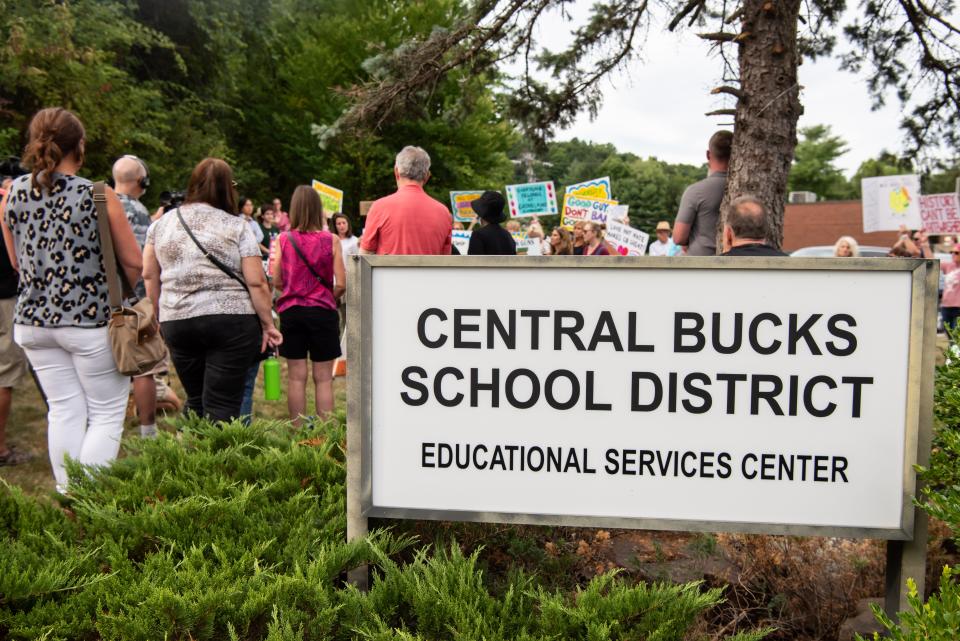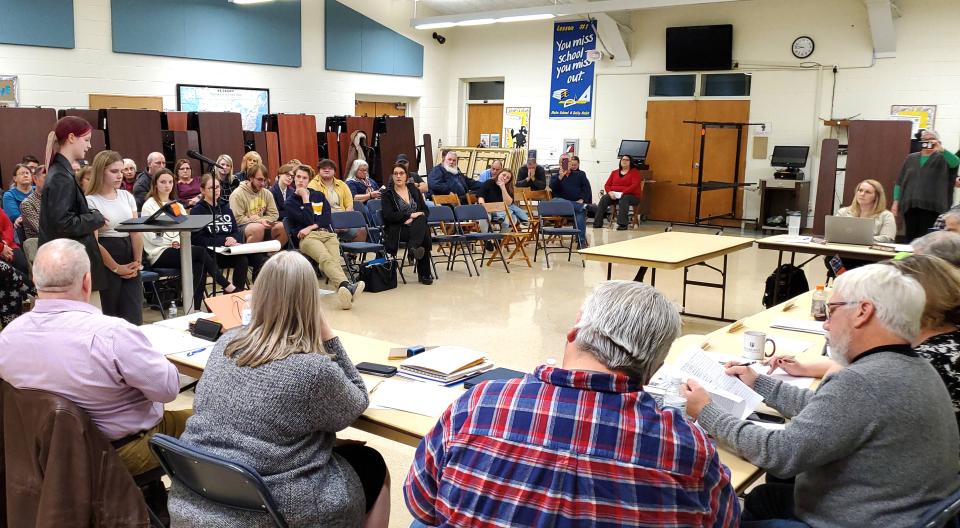Amid book banning efforts, House bill takes aim at stopping PA school library censorship
A legislative proposal from a Chester County Democrat aims to “depoliticize” school library policies that have become the focus of a national culture war which has spilled into Pennsylvania.
Rep. Paul Friel, of the 26th District, says his state House Bill 1506 could go a long way in meeting the concerns of parents rights groups while also preserving the First Amendment rights of students.
“I wanted to put in place a mechanism that maybe helped to depoliticize it a bit and provide an avenue for parents who were disputing what’s going on in the school district in either direction,” Friel said.
A former president of the school board at Owen J. Roberts School District, Friel said he’s seen firsthand how social media fervor can lead to heated public comments about some books, regardless of whether what’s said about those books are true or even if they aren’t in that district’s library.
House Bill 1506 would set a standard review process for book challenges, set boundaries on reasons why a book can’t be removed and codifies a process for parents to opt their children out of lessons or library materials “that conflicts with their beliefs.”
School libraries have become a central point of controversy for the past two years in Pennsylvania, starting with a “book freeze” in the Central York School District that took hundreds of books about racism out of circulation that ended after community protests in 2021.
Last July, Central Bucks School District, the fourth largest in the state, passed the controversial Policy 109.2 after months of contentious meetings where public commenters and free speech groups warned it would lead to banning books about racism and LGBTQ issues.

The guidelines in Policy 109.2, developed with the outside help of a religious liberty law firm, the Independence Law Center, has since been adopted or considered by several districts across the state.
ILC in PA Schools: Libraries to locker rooms: How a religious law firm is changing PA school policies
Book challenges have skyrocketed nationwide since then, the American Library Association has tracked thousands of book ban attempts across the country with many aimed at LGBTQ-themed books framed as pornographic material.
One side alleges that pornographic and obscene material is readily accessible to children of all ages and parents have a right to weed that material out. The other says bigoted fearmongering is seeking to silence voices in underserved communities and dismantle public education.
John Chrastka, executive director of nonprofit EveryLibrary, said the bill would be a “wonderful” step toward balancing parental rights over content and a child’s right to read.
EveryLibrary is an organization that lobbies for support of public libraries across the country and Chrastka said HB 1506 is a unique response to censorship efforts seen in Pennsylvania and nationwide.
“I hope that the General Assembly pays attention to it, that the education community rallies around it and that parents understand that this is a rights-affirmative way to extend the role of the school library in educating students,” Chrastka said in a recent interview.
Pennsylvania schools consider book challenge policies
Several school districts across the state have considered a library policy like the one in Central Bucks, which allows just about any resident to challenge a title and gives the district broad discretion to remove it for explicit or implied depictions of nudity or sex.
Those guidelines, often appearing as Policy 109.2, are mainly spearheaded by the Independence Law Center, the legal arm of the PA Family Institute.
PA Family lobbies for “traditional family values” and often opposes legislation that runs counter to Judeo-Christian beliefs, like anti-discrimination laws protecting LGBTQ individuals.
The group is affiliated with the nationwide Family Research Council, designated an anti-LGBTQ hate group by the Southern Poverty Law Center.
As previously reported, the ILC and PA Family have been working with officials in several school districts across the state for months, even years without the public’s knowledge.
While Central Bucks was the first to pass the ILC’s library policy, officials in nearby Pennridge School District were also working with ILC on a similar draft policy as far back as May 2022.
Pennridge passed its library policy in September, but a draft copy of the Central Bucks version had already made its way to the Warwick School District around the same time.
Emails show that the Lancaster County chapter head for Moms For Liberty, another designated extremist group by the SPLC, had forwarded Warwick School District board members the Central Bucks policy as officials there considered changes.
Warwick officials ultimately didn’t follow through on that suggestion, but a board majority across the state in Penncrest School District, Crawford County, did adopt a similar policy in January of this year.

Emails in Warwick and Penncrest also revealed that some school board members had either met or planned to meet with ILC attorneys about district business.
The Perkiomen School District, Montgomery County, was considering library policy compared to Central Bucks and led to protests at a March meeting.
While it’s not always clear if the ILC has been involved in developing policy, the library guidelines they helped create have become popular among more conservative parents and school boards in Pennsylvania.
Friel’s bill could upend those policies.
More: 'I'm coming for you': Central Bucks superintendent comment sounds like threat to some
What does PA state House Bill 1506 do?
Much of the spirit of Friel’s bill, the Freedom to Read Act, is couched in the landmark 1982 Supreme Court ruling between the Island Trees Union Free School District in New York vs. Stephen Pico.
In that case, the court ruled the objections by a group of parents over the content in some books did not supersede the free speech rights of every child in that district.
“Absolutely, a parent has the right to limit what their individual child has access to, they simply do not have the right to make that decision for other parents,” Friel said.
In its current draft, HB 1506 would require schools to provide parents with a list of materials or lessons their children could have access to and provide a process to opt their children out.
The bill would also make it illegal to remove a book simply because of the author’s or a character’s “race, nationality, gender identity, sexual orientation or political or religious views.”
Books about “sexual health” or related to “research, independent reading interests and educational needs of older students” based on age and grade level would also be protected.
Any title challenged would also have to be reviewed and considered in its entirety, not just based on a few excerpts that a parent might find objectionable.
Only a student, parent or legal guardian in the school district could file a complaint.
Friel’s bill would also make the review process a community board opposed to a collection of district employees.
Under 1506, one of 29 existing Intermediate Units would be tasked with forming an “educational resource review committee” made up of administrators and educators from multiple school districts in a region.
Some of these educational support groups established in 1971 serve entire counties while some serve larger areas crossing county lines.
Whether the title is removed or not, the complainant can appeal the decision to the Pennsylvania Department of Education.
Any book would also have to remain accessible in the library until the review committee has made its determination. This is a condition in Friel’s bill that also stops another problem the lawmaker said is harder to track.
Soft-censorship and shadowbanning
Most of Friel's Freedom to Read Act is focused on a standardized challenge process, but it also takes steps to prevent “soft censorship,” or removing books outside of that process.
If a parent in a district believes that books are being restricted to avoid an official challenge process, those suspicions can be reported to the state education department to investigate.
Friel said the reporting system would help combat what is probably “the biggest practical risk” to books singled out by parental rights groups and their advocates.
A librarian or administrator might be inclined to restrict access to a book based on constant complaints at public meetings in the hopes that it might “deal with the problem,” Friel said.
“I think that form of censorship is dangerous. It could have the effect that we start seeing diversity removed from our bookshelves, we start seeing LGBTQ stuff removed from our bookshelves, and then our library does not reflect the communities that we serve,” Friel said.
About a month before Central Bucks received its first batch of over 60 formal complaints under its library policy, the district was already conducting an “internal review” of five books mentioned at previous meetings.
More: Central Bucks School District orders librarians to remove two LGTBQ+ themed books
Maia Kobabe’s 2019 “Gender Queer: A Memoir,” an account of the author’s experiences growing up as non-binary, and Juno Dawson’s sex education book, “This Book Is Gay,” were ordered out of school libraries in May.
The books “Lawn Boy,” “Beyond Magenta,” and “Me, Earl and the Dying Girl” were also part of the internal review but allowed to remain in schools.
Superintendent Abram Lucabaugh previously said the five books were chosen because the titles came up throughout the library debate policy, and it’s the district’s responsibility to guard against the “sexualization of children.”
“To have not taken a look at some of the titles that were raised over more than a year ago, to pretend that we don’t know that graphic, illustrated, highly descriptive sexualized content is in some books, would be akin to looking the other way,” Lucabaugh wrote in a statement earlier this year.
These kinds of internal reviews, or any other action to remove a library book outside of a challenge process, would have been illegal under the provisions of HB 1506.
“That’s perfect for what’s been happening with us,” said Pennridge parent Darren Laustsen.
Laustsen has been involved in a legal fight over library records in Pennridge which he claims show that the district was removing books from circulation as part of a review for its library policy.
Through multiple records requests and eventually an appeal with the Office of Open Records, Laustsen claimed that multiple titles mentioned at prior meetings were completely checked out and not due back for up to a year.
Although Laustsen tried to obtain records detailing whether the books were checked out by “non-students” and why, the district said it gave what records it could but ultimately Laustsen’s accusations were based on an “erroneous assumption” regarding the online card catalog.
The OOR sided with the district and Laustsen is currently fighting that determination in the Bucks County Court of Common Pleas, currently awaiting an evidentiary hearing date.
A reporting system like the one in Friel’s bill probably would have prevented months of legal battles, Laustsen said.
“I wish I had somebody like that to go to … because I feel like I'm screaming into a void,” Laustsen said. “I definitely think that would be something that would have been helpful in this process.”
This article originally appeared on Bucks County Courier Times: PA House bill aims to protect school libraries from censorship

